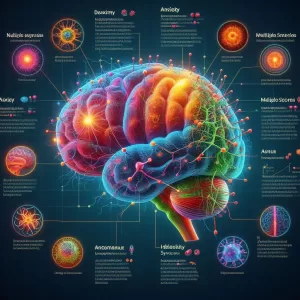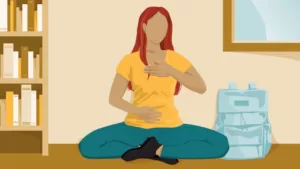Qu'est-ce que le trouble de l'adaptation ?
[wp_show_posts id=””]
**What is Adjustment Disorder?**
**Definition**
Adjustment disorder is a mental health condition that develops in response to a stressful life event or change that occurs within three months of the stressor. It’s characterized by intense emotional distress and difficulty adjusting to the new situation.
**Causes**
* Major life events: moving, job loss, divorce, death of a loved one
* Traumatic events: natural disasters, accidents, physical or sexual abuse
* Chronic stressors: financial hardship, illness, relationship problems
**Symptoms**
* Anxiety and depression
* Irritability and anger
* Difficulty concentrating and sleeping
* Social withdrawal and isolation
* Changes in appetite and weight
* Physical symptoms: headaches, stomach aches, fatigue
**Types of Adjustment Disorders**
* **With Depressed Mood:** Predominant symptoms include sadness, hopelessness, and loss of interest.
* **With Anxiety:** Predominant symptoms include excessive worry, nervousness, and panic attacks.
* **With Mixed Anxiety and Depressed Mood:** Combines symptoms of both types.
* **With Disturbance of Conduct:** May involve impulsive and aggressive behaviors that violate societal norms.
* **Unspecified:** Symptoms do not fit into any of the specific types.
**Diagnosis**
A mental health professional, such as a psychiatrist or psychologist, will diagnose adjustment disorder based on the following criteria:
* Presence of a stressful life event
* Symptoms develop within three months of the stressor
* Symptoms are excessive and beyond what would be expected in response to the stressor
* The symptoms cause significant distress or impairment in daily functioning
**Treatment**
Treatment for adjustment disorder typically involves:
* **Psychotherapy:** Cognitive behavioral therapy (CBT) and interpersonal therapy are effective in reducing symptoms.
* **Medication:** Antidepressants or anti-anxiety medications may be prescribed in some cases.
* **Lifestyle changes:** Stress management techniques, such as exercise, mindfulness, and sleep hygiene, can be beneficial.
**Recovery**
Most people with adjustment disorder recover within a matter of months, especially if they receive proper treatment. However, symptoms may persist or worsen if the underlying stressor is not addressed or resolved.
**Prevention**
Preventing adjustment disorder is not always possible, but coping strategies can help individuals manage stress and reduce their vulnerability to the condition. These strategies include:
* Developing healthy coping mechanisms
* Seeking support from family, friends, or a therapist
* Engaging in activities that bring pleasure and relaxation
* Maintaining a healthy lifestyle
* Being proactive in addressing potential stressors
**What is Adjustment Disorder?**
**Definition**
Adjustment disorder is a mental health condition that develops in response to a stressful life event or change that occurs within three months of the stressor. It’s characterized by intense emotional distress and difficulty adjusting to the new situation.
**Causes**
* Major life events: moving, job loss, divorce, death of a loved one
* Traumatic events: natural disasters, accidents, physical or sexual abuse
* Chronic stressors: financial hardship, illness, relationship problems
**Symptoms**
* Anxiety and depression
* Irritability and anger
* Difficulty concentrating and sleeping
* Social withdrawal and isolation
* Changes in appetite and weight
* Physical symptoms: headaches, stomach aches, fatigue
**Types of Adjustment Disorders**
* **With Depressed Mood:** Predominant symptoms include sadness, hopelessness, and loss of interest.
* **With Anxiety:** Predominant symptoms include excessive worry, nervousness, and panic attacks.
* **With Mixed Anxiety and Depressed Mood:** Combines symptoms of both types.
* **With Disturbance of Conduct:** May involve impulsive and aggressive behaviors that violate societal norms.
* **Unspecified:** Symptoms do not fit into any of the specific types.
**Diagnosis**
A mental health professional, such as a psychiatrist or psychologist, will diagnose adjustment disorder based on the following criteria:
* Presence of a stressful life event
* Symptoms develop within three months of the stressor
* Symptoms are excessive and beyond what would be expected in response to the stressor
* The symptoms cause significant distress or impairment in daily functioning
**Treatment**
Treatment for adjustment disorder typically involves:
* **Psychotherapy:** Cognitive behavioral therapy (CBT) and interpersonal therapy are effective in reducing symptoms.
* **Medication:** Antidepressants or anti-anxiety medications may be prescribed in some cases.
* **Lifestyle changes:** Stress management techniques, such as exercise, mindfulness, and sleep hygiene, can be beneficial.
**Recovery**
Most people with adjustment disorder recover within a matter of months, especially if they receive proper treatment. However, symptoms may persist or worsen if the underlying stressor is not addressed or resolved.
**Prevention**
Preventing adjustment disorder is not always possible, but coping strategies can help individuals manage stress and reduce their vulnerability to the condition. These strategies include:
* Developing healthy coping mechanisms
* Seeking support from family, friends, or a therapist
* Engaging in activities that bring pleasure and relaxation
* Maintaining a healthy lifestyle
* Being proactive in addressing potential stressors
Un commentaire
Laisser un commentaire
Articles populaires








Adjustment Disorder is a mental health condition that can develop in response to a stressful life event.